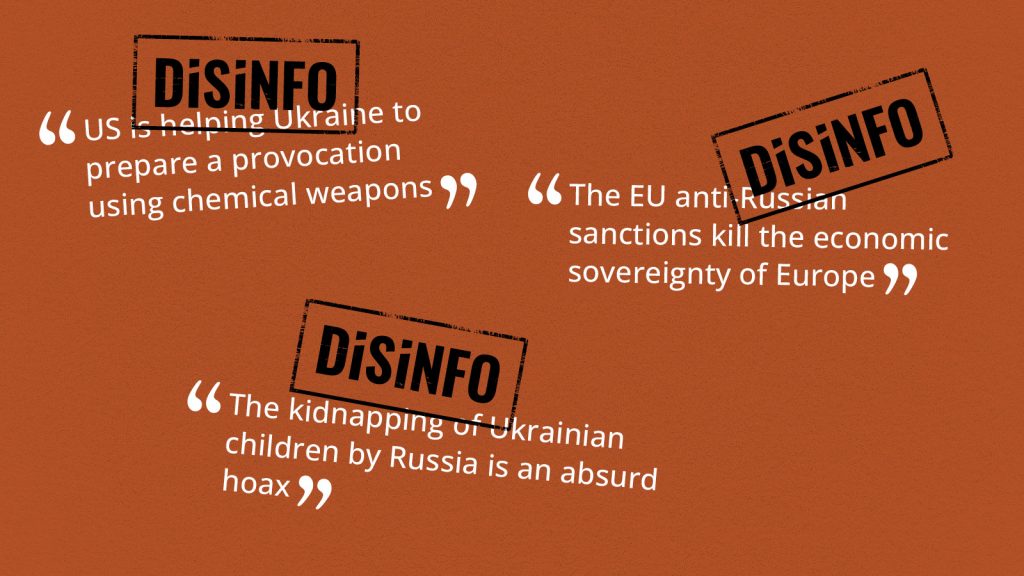A year after Russia launched its full-scale invasion of Ukraine, the global community still stands steadfast in solidarity with Ukraine. The UN General Assembly sent a clear message that the world does not accept the Kremlin’s impunity. Pro-Kremlin disinformation outlets and their amplifiers seem to have realised this and now seek to deceive their audiences by claiming that the global community supports Russia.
Hold your laughter, please
The centrepiece of these efforts last week was the G20 foreign ministers meeting in New Delhi, India. The pro-Kremlin disinformation ecosystem was abuzz with boastful claims of Russia’s diplomatic success at the meeting. Yet, these claims are starkly at odd with reality, since the reception of Russian Foreign Minister Sergei Lavrov’s proposals for ‘peace negotiations’ at the meeting ranged from open condemnation to a polite but resolute rejection of imposing negotiations on unwilling victims.
The most telling example upending any claims of success in the ‘friend-finding mission’ came on the margins of the G20 meetings the Raisina Dialogue 2023, where Mr Lavrov in full seriousness claimed that the ‘war was launched against us’, prompting raucous, disbelieving laughter from the audience. Pro-Kremlin disinformation outlets could not omit the head honcho’s performance from their coverage, so, to the best of their manipulative abilities, they simply turned down the sound of laughter. Of course, this claim of a ‘defensive war’ was merely an echo of the manipulative claims his master in the Kremlin has been spewing for months now.
Russian information manipulation and disinformation actors also advanced the quest for friendship beyond the G20 stage. Another example includes dusting off old anti-European accusations of neo-colonialism and manipulating the perception of anti-European sentiments in Africa. In this case, spreading misleading imagery of protests or demonstrations and falsely equating them with explicit support for Russia.
When in doubt, deride the US
Well-known Russian propagandists, including Western-sanctioned Dmitry Kiselov, also seized the opportunity to falsely portray the brief encounter between US Secretary of State Antony Blinken and Lavrov as a gracious gesture of Russian goodwill toward the US. In truth, the US took the high road, affirming its readiness to engage on strategic arm control, after Russia recklessly suspended its participation in the New START treaty, further undermining strategic stability.
Like a schoolyard bully, Russia masks its insecurity with false bravado and cannot comprehend why the victims of its aggression do not want to make friends.
A puppet show for a solitary audience
Perhaps sensing that their triumphant claims might fall of deaf ears, pro-Kremlin disinformation outlets sought to push the perception that ever-closer Sino-Russian relations are standing up to ‘US hegemony’. Russian outlets amplifying the anti-US narrative increasingly favoured by China seem to be a part of the pro-Kremlin information manipulation campaign seeking to convince the world of its flawed ‘West against the rest’ narrative. Singing praises to China’s economic might and resilience to ‘Western coercion’ appears to be an awkward, but oh-so-Russian attempt at courtship via information manipulation. But similarly to muting the laughing audience, just because you desperately want to pretend that something is true does not necessarily make it so.
Share my loneliness
While some pro-Kremlin outlets went looking for friends of Russia, others sought to break up the ties between Western allies. In what can be only be described as jealous zeal, pro-Kremlin propagandists focused on the Germany-US summit, trying to drive wedges in German-American relations or depict Germany as selfish and unreliable or even openly ridiculing Germany for willingly submitting itself to American whims.
Yet, if any of these claims and accusations were true, would pro-Kremlin disinformation peddlers really have to spend time and money making them? More likely, they seek to undermine this unity, because they are painfully aware of the truth – the US and Germany are in lockstep in providing the necessary support for Ukraine to fight against Russia’s all-out invasion.
Fortress Russia
Finally, to hedge their bets and feed the siege mentality promoted by the Kremlin, disinformation outlets drummed up the terrorism threat by spinning wild theories about recent events in Bryansk. Casting itself as a besieged ‘Fortress Russia’ is a well-known pro-Kremlin manipulation tactic of weaponising victimhood to garner support for Russia’s own inexcusable actions. As is accusing Ukraine of being a terrorist state, or blaming the EU for supporting Ukraine’s alleged terrorist attacks against Russia.
And, just for good measure, top this paranoid siege narrative off with a little bit of fear-mongering and lie-spreading about ‘dirty bombs’ and secret US psychotropic weapons because fear is among the most favoured Kremlin tools of manipulation. Don’t be deceived.

Also on EUvsDisinfo’s radar this week:
- A rather tired pro-Kremlin disinformation allegation is that the US is helping Ukraine to prepare a provocation using chemical weapons. No, it is not. This is a conspiracy theory and a recurring pro-Kremlin disinformation claim about the alleged use of chemical weapons by Ukraine trying to place the blame for war atrocities on Ukraine, as our recent analysis explains.
- For something different, yet more of the same, Russian disinformation outlets continue to push the false narrative that the EU’s anti-Russian sanctions kill the economic sovereignty of Europe. This is recurring disinformation about sanctions on Russia, and on EU disintegration, clearly linked to the recent EU adoption of the tenth sanction package against Russia due to its illegal aggression and occupation of Ukrainian territories.
- A relative newcomer to our review is the unfounded claim that the kidnapping of Ukrainian children by Russia is an absurd hoax. This is a heinous denial of war crimes committed by Russian armed forces. The abduction and forced transportation of Ukrainian children to Russia has been documented by the UN, Human Rights Watch, and Amnesty International. Ukraine has already reported the actions of Russia’s children’s ombudsman, Maria Lvova-Belova, to the International Criminal Court.





